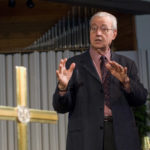The ministry of the Disciple Nations Alliance is based on the conviction that truth has the power to transform lives, communities and even nations. Broken, impoverished communities are transformed when the church confronts cultural lies, and embodies and proclaims the truth. Helping the church do this is the beating heart of our ministry.
Some call this a “worldview” approach to community development. That word “worldview” is one we at the Disciple Nations Alliance use often. Like “Trinity” and “missionary,” the term doesn’t appear in the Bible. It isn’t used in English literature until the early 1800s. Even then, it is rarely employed until about 1960. But from 1980 onward, its use has exploded.
Today, there are a plethora of books, conferences, articles, and study programs on “worldview.” In evangelical circles, there is much talk about “biblical” or “Christian” worldview. The Disciple Nations Alliance bears some responsibility (or blame!) for this.
What’s behind this sudden interest in “worldview?” What do we even mean by “worldview?”
Exactly what is a worldview?
I like the simple definition from Phillip Johnson in his foreword to Nancy Pearcey’s masterful book, Total Truth: “Our worldview is the [mental] window by which we view the world, and decide, often subconsciously, what is real and important, or unreal and unimportant.”
 Dallas Willard offered a similar definition: “Worldview … consists of the most general and basic assumptions about what is real and what is good—including our assumptions about who we are and what we should do.”
Dallas Willard offered a similar definition: “Worldview … consists of the most general and basic assumptions about what is real and what is good—including our assumptions about who we are and what we should do.”
These “general and basic assumptions” come from our surrounding culture. We pick them up from our earliest days—from parents, teachers, friends, media figures and celebrities. They are filtered through books, films, television, and other forms of media. Because everyone has these assumptions, everyone has a worldview. You can’t “opt out.”
Dallas Willard goes on to explain that our worldviews “lie outside our consciousness … embedded in our body and in its social environment, including our history, language and culture. [Our worldviews] radiate throughout our life as background assumptions, in thoughts too deep for words.” Philip Johnson concurs: “Our worldview governs our thinking even when—or especially when we are unaware of it.”
The word “govern” is very important here, and it explains why worldviews are so important—they direct our thinking and determine how we behave even without our awareness. As Willard says, “there is nothing more practical than our worldview, for it determines the orientation of everything else we think and do … What we assume to be real and what we assume to be valuable will govern our attitudes and actions. Period.”
Head knowledge does not equal a worldview
George Barna, the famous Christian researcher, has published studies about how many Christians have “a biblical worldview.” He determines this by asking Christians in his research group questions about their knowledge of biblical doctrines. His measure of whether someone has a biblical worldview is based on what they know, or head knowledge.
 But I would argue that worldview isn’t head knowledge. There is a difference between head knowledge and the unquestioned, background assumptions that drive people’s actions. You can teach someone the core doctrines of the Christian faith in a few days, but that doesn’t mean they have a Christian worldview. We “see” a person’s worldview by the choices they make—by how they live their lives. Jesus said, “By their fruit you will know them” (Matthew 7:15-20). Our fallen nature means that all of us are prone to hypocrisy—a gap between our head knowledge and our behavior.
But I would argue that worldview isn’t head knowledge. There is a difference between head knowledge and the unquestioned, background assumptions that drive people’s actions. You can teach someone the core doctrines of the Christian faith in a few days, but that doesn’t mean they have a Christian worldview. We “see” a person’s worldview by the choices they make—by how they live their lives. Jesus said, “By their fruit you will know them” (Matthew 7:15-20). Our fallen nature means that all of us are prone to hypocrisy—a gap between our head knowledge and our behavior.
If that is “worldview,” a Christian or biblical worldview is the set of background assumptions about reality and human existence that comes to us in several ways: through God’s revelation in the Bible, through creation itself (Romans 1:19-20), through “the law written on the heart” (Romans 2:15), and through the broader culture to the degree it has been shaped over time by biblical truth.
The biblical worldview is the truth. It is the only worldview that accords with the real world and lived human experience. All other worldviews are distortions of the truth. As Christians, the Holy Spirit works in us, helping us uncover the false background assumptions we’ve absorbed from the surrounding culture, empowering us to replace false assumptions with the truth, and ordering our actions and behaviors accordingly.
Behind all distorted worldviews is Satan, the deceiver. He uses deception at the level of worldview to enslave and ultimately destroy individuals and entire nations. The good news is that God, in Christ, provides a way of rescue. He grants to His followers repentance (the Greek word is “metanoia,” or literally, a changing of the mind), “leading them to a knowledge of the truth” and helping them “come to their senses and escape from the trap of the devil, who has taken them captive to do his will” (2 Timothy 2:25-26).
A biblical worldview affects how we think and act
As Christians, we are called to inhabit the culture of God’s Kingdom and to think with “the mind of Christ” (1 Corinthians 2:16). We are called “to take every thought captive to make it obedient to Christ” (2 Corinthians 10:5) and to “be transformed by the renewing of our minds” (Romans 12:2). In short, we are called to think and act differently—not in accordance with the accepted norms, attitudes and behaviors of our surrounding culture, but in accordance with reality as presented in God’s Word.
A biblical worldview begins with two foundational assumptions: (1) Jesus is king over all, and (2) His word is true. The great Dutch theologian and statesman Abraham Kuyper, reflecting on this, famously said: “There is not one square inch of the entire creation about which Jesus Christ does not cry out, ‘This is mine! This belongs to me!’”
If you build your life on the foundation of these twin truths, you’ll steadily gain a biblical worldview. You’ll bow before Jesus as Lord over “every square inch” of creation, and you’ll treasure God’s word as an accurate guide to reality—a sure handbook for all of life. Ken Myers of Mars Hill Audio put it this way:
Faithfulness to the Lord of all Creation is … faithfulness in every realm of human experience, from science to sports, from making movies to making babies, from how we build relationships to how we relate to buildings. Following Christ is a matter first of inner transformation, and then of living faithfully in accord with the order of Creation as he made and is redeeming it, in all of our cultural convictions and practices concerning a host of abstractions and concrete realities: food, sex, time, music, history, language, technology, family, justice, beauty, agriculture, and community.
What happens when the Bible doesn’t inform your worldview
Here’s the problem. For nearly a century, committed, evangelical Christians haven’t thought this way. The Bible hasn’t informed how we think (and act) with regard to time, music, history, technology or a host of other things. We turn to the Bible as our authority on spiritual topics like faith, salvation, and evangelism–the kinds of things Barna deals with in his research–but we leave it behind when thinking about almost everything else. When dealing with so-called “worldly” subjects, we assume Jesus isn’t in charge, and turn to other authorities for knowledge—worldly experts and teachers.
 As a result, we develop a kind of quasi-biblical worldview—a syncretistic worldview that embraces biblical truth for some things, while adopting prevailing cultural assumptions for everything else. Tragically, this has prevented the church from being salt and light in a dying world that God loves and is working to redeem. In far too many areas, the church believes and behaves no differently than the surrounding culture.
As a result, we develop a kind of quasi-biblical worldview—a syncretistic worldview that embraces biblical truth for some things, while adopting prevailing cultural assumptions for everything else. Tragically, this has prevented the church from being salt and light in a dying world that God loves and is working to redeem. In far too many areas, the church believes and behaves no differently than the surrounding culture.
The loss of the biblical worldview is the bad news. The good news is that things are changing. There is mounting evidence that we are living at a “kairos” moment—a pivotal time where old paradigms are giving way and new ones are emerging. I am convinced that God is using this topic of “worldview” to help His bride recognize this syncretism, reject it, and begin to think biblically, once again, about everything.
This really is good news, because historically, when the church has functioned consistently from a biblical worldview, she has been an unstoppable force for social and cultural transformation. Helping to equip the church to do this, in very practical ways, is the beating heart of the Disciple Nations Alliance.
- Scott Allen







2 Comments
Christian Overman
September 22, 2017 - 6:42 amExcellent, Scott. I am reminded of the words of my mentor, Dr, Albert Greene, who impressed upon my mind the fact that the Hebrew understanding of “knowledge” required “doing.” That is, a person didn’t really “know” something until he or she “did” it. Also, to underscore your point that having a “head knowledge” of biblical doctrine does not mean you really have a biblical worldview, we must remember that the Devil knows Jesus is Lord of all (and he trembles), but this does not affect the way he acts. He knows what is True, but does not live accordingly. He doesn’t “own” the biblical worldview. Onward and upward, Scott.
admin
September 22, 2017 - 10:29 amThanks so much, Christian, for adding even more value to Scott’s excellent article. You are a gift to the DNA, brother.
Gary Brumbelow